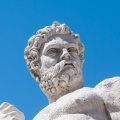People who changed the world: Muhammad (570 — 63) The founder of Islam, Martin Luther King (1929 — 196) The leader of civil rights, Abraham Lincoln (1809 — 186) American president during the civil war, helped end slavery, Nelson Mandela (1918 — 201), anti-apartheid leader, first president of democratic South Africa in 1994.Abraham Lincoln, the 16th president of the United States, was a man who lived by what he believed in. He was the leader the country needed during one of the darkest moments in American history, he led the Union to victory over the Confederacy and abolished slavery with his Emancipation Proclamation, which made him one of the most beloved presidents in the United States. Nikola Tesla was an inventor, engineer, physicist and futurist who made a significant contribution to electrical science and technology while working with Thomas Edison, although their turbulent working relationship caused by competing ideologies is well known, and the two scientists later separated for good. Tesla's most important contribution to the world was its invention of alternating current, a revolutionary technology that made the transmission of electricity over long distances much cheaper.
Sometimes they bring smiles, and Nelson Mandela's became a trademark of the charismatic leader. For a man who spent 27 years in prison for opposing the cruel apartheid system in South Africa, he still had the strength needed to guide his country to liberation and became an inspiration to millions of people. There's no way we won't mention him among the most important people in history. Tired of a full day of work, Rosa Parks boarded a bus from Montgomery on December 1, 1955 and forever became one of the inspiring people who changed the world.
When she refused to obey the driver's order to leave her seat and go to the back of the bus so that a white person could sit there, she was arrested for civil disobedience. The Parks act of defiance and the Montgomery bus boycott that followed are recognized as pivotal moments in the civil rights movement. Here are 13 human rights that are not yet universal, but should be. Marx's Communist Manifesto (184) inspired revolutionary leaders from all over the world, from Lenin to Mao and Castro, and, of course, gave rise to various ideological struggles between modern civilizations.
Even today, all the debates we see and hear related to globalization, poverty, inequality, environmental damage and the obsession with consumerism come directly from a battle of ideas that dates back to Karl Marx. In 1828, something quite remarkable happened. A German scientist named Friedrich Wöhler discovered that chemicals produced by life itself could be artificially recreated in a laboratory. He did this while trying to make ammonia cyanate, but by accident, he managed to synthesize something completely different.
In 1801, Cornish inventor Richard Trevithick increased the pressure of his “Puffing Devil” steam engine and created a high-pressure steam. This was a truly significant moment in human history. For the first time, someone had created a machine that did not depend on any of the Earth's forces at all. The steam allowed the engine to be mounted sideways on a track and cause it to pull a wagon simply using raw materials rich in energy from the Earth itself (coal, oil and natural gas).
In the spring of 1519, a Spanish mercenary and conquistador named Hernán Cortés landed on the Yucatan Peninsula, Mexico, with 11 ships carrying around 110 sailors, 530 soldiers, a doctor, a carpenter, some women and some slaves. However, only 18 months after the arrival of Cortés, the great city that was the key to the entire Aztec Empire, was in Spanish hands. Despite initially welcoming the Spanish as guests, the Aztec emperor soon found himself captive in his own palace. The Spanish quickly set about emptying the palace of treasures and massacring hundreds, if not thousands, of the local population.
Over the next few centuries, the native population would decline by about 90 percent compared to the 500 million that existed just before the arrival of Columbus. The actions of Hernán Cortés and of contemporaries such as Francisco Pizarro, who ended the Inca Empire, resulted in the most devastating conquest in all of human history. By 651 AD, it had taken hold of the formerly strong Sasanian Empire of Persia and had reached the north of what is now Pakistan. Further west, Muslim armies conquered North Africa and Spain.
If it weren't for the miraculous victory of the Frankish ruler Charles Martel in Poitiers in 732 AD, they may have conquered Western Europe. The greatest legacy of Islam was the rise and expansion of political and commercial empires across vast swaths of Eurasia that ultimately helped connect Eastern and Western cultures. The Kalinga War ended with the famous Battle of Kalinga, which left more than 100,000 dead on the battlefield. A day later, Ashoka crossed the city, where, as far as the eye could see, all he could see were burned houses, dead horses and scattered bodies.
At that moment, he let out a scream, saying, “What have I done?” over and over again. Hammurabi, the famous king of Babylon, established a code of laws that helped transform and stabilize his city into the most powerful of all those in Mesopotamia. A copy of its 282-law code was prominently displayed on an eight-foot tall stone slab in the center of the city for everyone to see. Therefore, ignorance of the law was never accepted as an excuse, and this principle persists in most modern societies.
Hammurabi had laws chiseled in stone so that they were immutable; that's where the phrase “engraved in stone” comes from to describe the permanence of something. Royal Raymond Rife should have been on this list, the most impactful and most forgotten genius inventor who cured cancer decades before chemotherapy was thought of and was only recorded in the 1920s, when it was discovered in the 19th century. I hate numbers 9 and 10, they're disasters, people. That's a pretty tough list when Jesus only finishes third, lol.
A fascinating and informative center. Unfortunately, I didn't even know 2 of the 8 people (Richard Trevithick and Friedrich Wohler), but now I do it thanks to this excellent center, job well done. He voted in favor and in all areas. I love your “10” cubes, J.
This one also left me paralyzed. Normal Barlaug is a person who exemplifies Marshall's comment. It is said that by creating a high-yielding strain of wheat, he saved a billion lives. In the 1970s, famine was a threat in some parts of the world and drove China's one-child policy.
While others were calculating the lives that would be lost, he did something about it. Thank you, MG, yes, Gandhi is another one who could have made this list. It was quite difficult to narrow it down to 10, although I enjoyed learning about Ashoka, what a fantastic man. It's a shame that their ideas didn't go beyond Asia until relatively recently.
Jesus would probably be the person who changed history the most -_- but people who think so, despite Hitler, still work the same way. Chairil changed the world by standing up for what he believed in and by helping the development of the Indonesian language. Ronaldo has changed the world of football not only because of how popular he is, but also because he inspires today's young people to play like him on the field. Undoubtedly, the list contains some of the popular people who played a key role in changing history.
About 1400 years ago, this merchant from the Arab city of Mecca had a series of visions in which he saw the Archangel Gabriel reveal the true and last word of Allah. Centuries later, Misty Copeland became one of the inspiring people who changed the world by demonstrating that ballet was not reserved only for white people or the rich. Tunisian street vendor Mohamed Bouazizi never had any bigger dream than to save enough money to rent or buy a van, but he became one of the inspiring people who changed the world. He never thought that he would be among other people who changed the world and influenced generations of people.
Pablo Picasso is one of the most interesting and important figures in 20th century art, who changed his style drastically throughout his life. At summer boarding schools, there are plenty of opportunities for you to also become one of the people who are changing the world through art. . .



